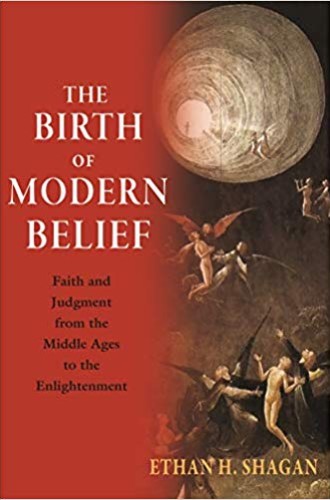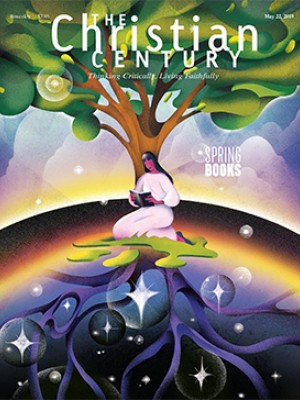The emergence of belief—and unbelief
Ethan Shagan chronicles the expansion of these concepts since the Middle Ages.
Many Christians spend a great deal of time agonizing over belief and struggling against doubt. Yet they keep following Jesus, they keep being caring and compassionate, regardless of how their intellect views Christianity at any given moment in time. If one’s self cannot be wholly separated from one’s actions, it seems these people do believe in Jesus. So I often wonder: Is belief overrated?
After reading Ethan Shagan’s history of belief, I’m not convinced I’ve been asking the right question. As it turns out, what I mean by belief is quite different from what Christians across the centuries have meant by it. Shagan’s book is disorienting, because it troubles assumptions about a word we think we know. That is precisely why the book is so compelling.
Read our latest issue or browse back issues.
Shagan, who teaches history at the University of California at Berkeley, tracks belief from medieval Europe through modern Western culture. During the medieval period, belief was a category that negotiated between divine transcendence and human finitude. Because humans cannot fully know the divine, belief was a bridge between the eternal and the contingent. It was a wide category, Shagan says, since anyone could believe, “from the bishop to the ploughman.” The medieval notion of implicit faith meant that people could believe things they did not understand, even aspects of doctrine they had never heard of. At this point, belief remained closer to—if still distinct from—the Greek pistis, which connotes trust more than adherence to propositions.
But in the Reformation and the Counter-Reformation, Protestants, Catholics, and Anabaptists each made belief their own possession, to the exclusion of others. For Luther and many who followed, belief entailed holding correct doctrine and applying that doctrine to oneself. Propositional belief became a part of saving faith. Christianity shifted “from a body of people to a body of beliefs,” as historian John Bossy has put it.
At the same time, the new category of unbeliever emerged. Indeed, by the strict criteria of this confessional era, suddenly unbelievers proliferated. European society and state functions began organizing around unbelief rather than belief. With new forms of governmental authoritarianism, Protestants in some areas regulated unbelieving citizens and Catholics in other areas disciplined citizens into becoming believers.
By the 17th century, European intellectuals began to push back. As Christians sought more inclusive understandings of the term belief, its connotation began to shift decisively. Belief began to connote sovereign judgment rather than exclusive adherence to doctrines. From philosophers like Montaigne to theologians like Arminius, belief moved closer to meaning “sound and judicious consideration.” The Enlightenment pushed further in this direction. Theologians and apologists began to defend Christian belief through probabilistic reasoning, just as scientists defended their theories.
Understanding of knowledge was shifting at the same time. Knowledge no longer implied demonstrated certainty, as it had in medieval Europe. Europeans came to rely on probable knowledge more than certain knowledge, and the domain of knowledge expanded. As belief began to share epistemic territory with opinion, knowledge, and judgment, it moved beyond religion to include science, politics, economics, and other fields.
Another key shift emerged in the early modern era: people began to believe in things that humans make. In politics, for example, the state became an invented social contract rather than an aspect of providential ordering. One’s assent to something could “produce a truth that is not already there.” Decimals were adopted in the West during this time, and they were often called “imaginary numbers.”
Shagan’s book is a powerful counternarrative to the assumption that belief is in decline. Belief has not decreased; if anything, it has expanded, even while it has become more diffuse.
Today we believe and disbelieve all sorts of things, from the divine to the secular and everything in between. We believe in climate change (or not). We believe in political platforms. (Remember Mitt Romney’s slogan, “Believe in America”?) As Shagan puts it, we are “promiscuous” in what we believe.
Some people might lament the diffusion of belief beyond Christianity, but Shagan is not among them. He recognizes that Western culture’s lack of shared beliefs means that it often lacks shared reference points for moral deliberation. But he also recognizes just how dramatic—and strange—the modern understanding of belief is. While Westerners no longer share beliefs, we at least agree that all of us hold beliefs. Such agreement was not a given in prior eras. The capacity to see another’s views as beliefs while not believing them oneself, Shagan believes, is what binds together pluralistic Western societies.
As a Christian, I find Shagan’s book strangely reassuring. Belief might not be directed where it once often was—to Jesus, the church, and ministry. But the fact that people still do believe, and do so quite relentlessly, is cause for hope. After all, the search for belief lends itself to a search for the grounding of belief, which presses us to ask religious questions. Though church attendance is in decline, religious questions are not going away; people continue to believe in all sorts of things. Christians can remind people that there is a grounding for all of those beliefs—a grounding beyond humans themselves.
Shagan’s book motivates us to reassess belief. Not simply propositional knowledge, belief these days may look more like trust in the divine, a trust that inherently draws us into a body greater than ourselves. For Christians, that is a start for rethinking belief.






